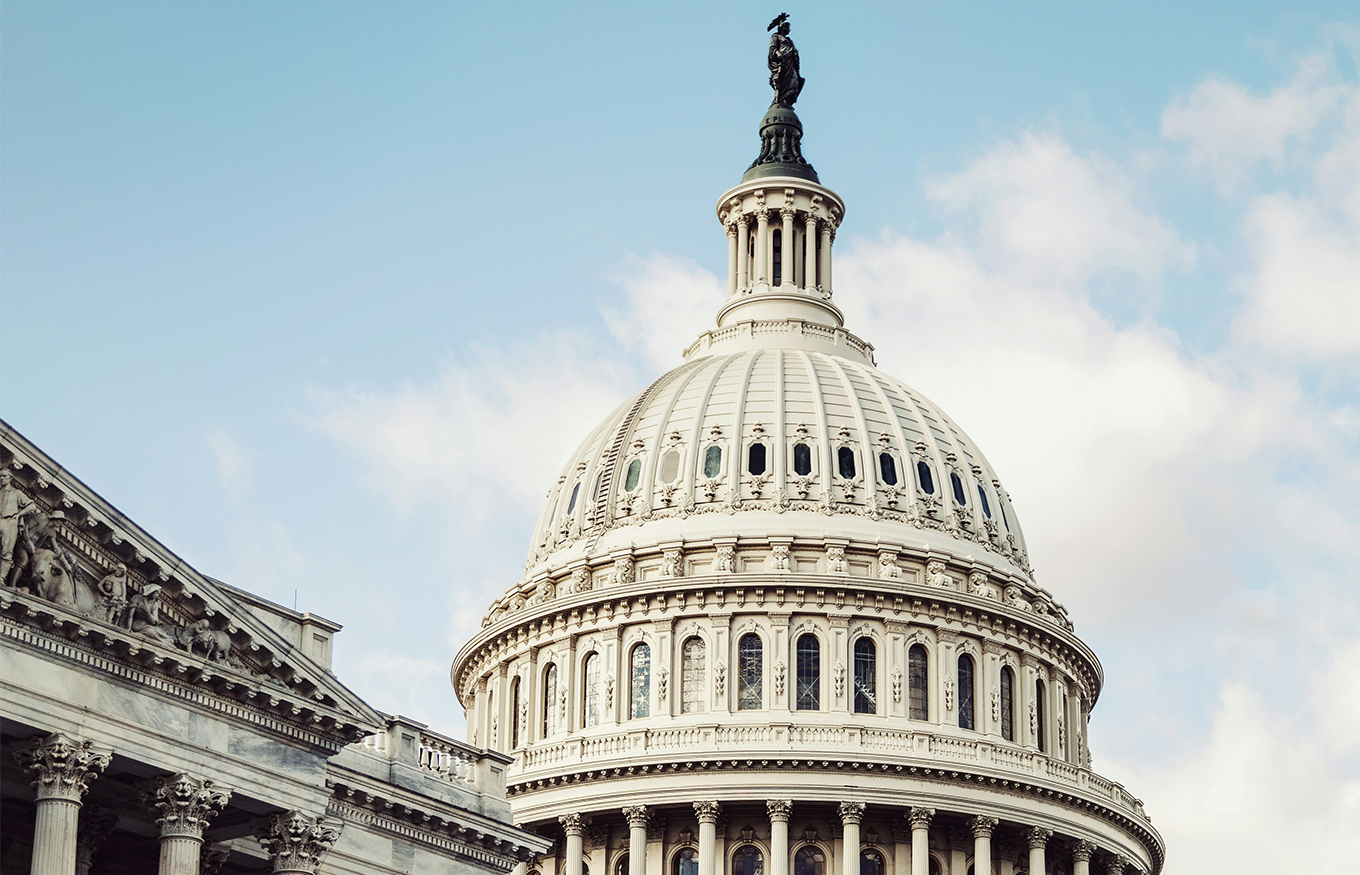Introduction
America’s elections face three existential threats in the coming years: An exodus of election officials, the potential of election manipulation, and inadequate funding of our critical election infrastructure. Congress and the states can help reduce these threats if they act now.
In the wake of a massive and coordinated disinformation effort during the 2020 elections, election officials and election workers — who do the behind-the-scenes work of running our elections and ensuring their safety and accuracy — have faced threats of violence and harassment, which has led to an exodus of good people from these positions.
At the same time, we’re seeing a wave of anti-democracy, conspiracy-minded candidates running for positions as election officials, and statehouses across the country are considering or passing bills that would place election administration under greater partisan control for their own political gain.
Faith in elections and the acceptance of the results by political candidates, the parties, and the public are among the most essential ingredients of a functional democracy. They are also critical components of how we run elections in the United States. Yet faith in American elections is waning disturbingly quickly, fueled in large part by disinformation about the 2020 elections — and by the fact that a significant number of established political figures, including former President Donald Trump, continue to lie about the results of the 2020 presidential election. Some of these figures are now running for election administration positions themselves.
In reality, despite the challenges of a once in a lifetime pandemic, voter turnout surged in 2020, with nearly 160 million Americans, or roughly two-thirds of all eligible voters, casting ballots. That was thanks in large part to the ingenuity and flexibility of election officials, election workers, and volunteers, who came from both parties, and in some cases, no party at all. Like previous elections, legal challenges worked themselves through the courts. No courts found any evidence of wrongdoing or reason to doubt the results of the 2020 presidential election. And the results were certified by Democratic and Republican officials across the country.
This should have been a cause for celebration and a continuance of the democratic tradition of all parties accepting the final results, after recounts and legal challenges have concluded. Yet it wasn’t. A February 2022 poll found that 56% of Americans actually have little to no confidence that U.S. elections reflect the will of the people, up from 40% who felt that way in January 2021. While only about one-third of Democrats expressed these concerns in February, 59% of independents and 74% of Republicans did.
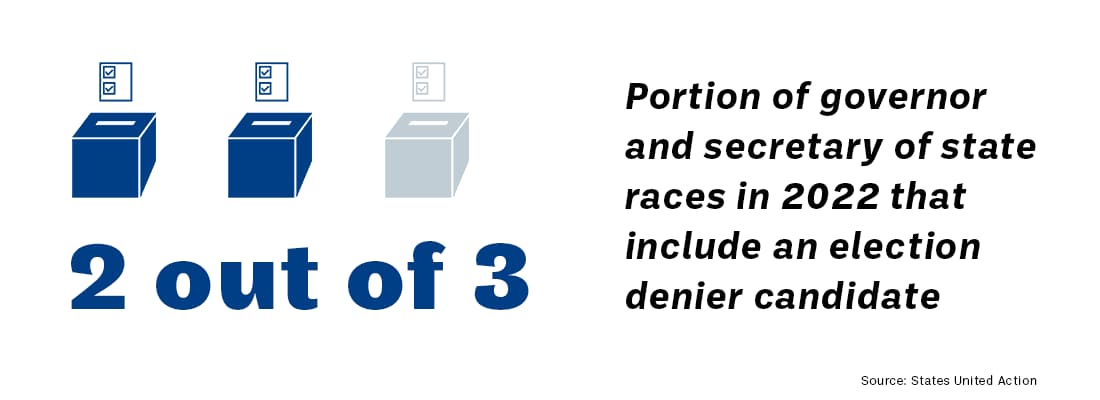
Disinformation campaigns that sow doubts about the administration of U.S. elections and harassment campaigns that target election officials and election workers are two parts of the same strategy to erode the foundation of democratic elections in the United States.
The most essential remedies to these negative trends are 1) combatting election disinformation and efforts to manipulate elections, 2) providing more federal and state funding for vital election infrastructure, and 3) protecting election officials, election workers, and their families — our friends, neighbors, and family members who help run our elections in every state, county, and city across the country.
To do this, we need swift action at every level of government. Within the executive branch, the Department of Justice should increase its enforcement of threats against election officials. And Congress should pass new legislation that protects election workers, safeguards against subversion, and increases funding for state and local election administration.
Moreover, individuals, corporations, schools, and nonprofit organizations should support and help recruit more poll workers and election workers who put voters first. And social media companies, flush with cash, could spend much more money flagging and fighting election-related disinformation on their platforms.
As Commissioner Benjamin Hovland of the Election Assistance Commission has said: “Our democracy is at crossroads; election officials and others have been sounding the alarm, and if we do not take real steps to address these threats, our democracy will be in peril.”

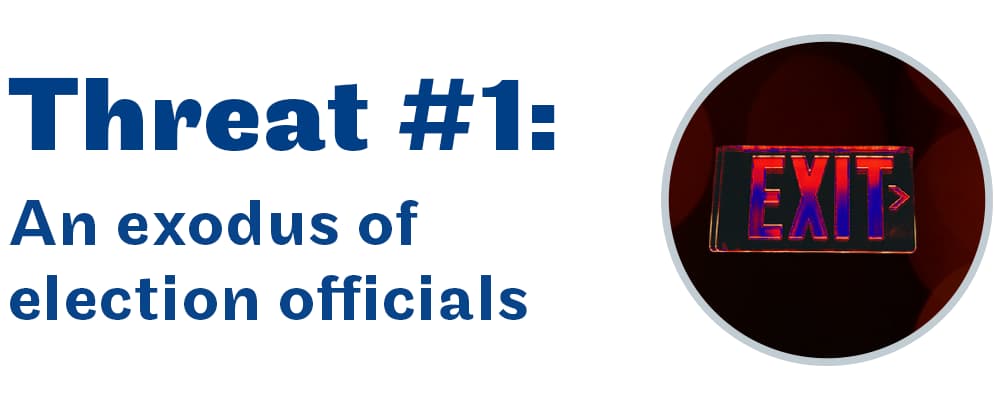
Election administrators and election workers are leaving their positions in droves.
One reason is the influx of threats against their lives and the lives of their families. Since the 2020 election, election administrators have been regularly threatened, mainly by the most extreme supporters of former President Donald Trump, who continue to deny the reality that the 2020 elections were fair, safe, and secure, and that President Joe Biden won.
According to a recent survey by the Brennan Center for Justice, 17% of local election officials have been threatened and 32% have felt unsafe because of their job. As of December 2021, Reuters had documented more than 850 threatening and hostile messages that targeted election officials and election workers since the 2020 election.
Local election officials tend to be older. According to a recent survey by Democracy Fund, 74% of chief local election officials are over age 50, and 25% are over age 65. More than one in three is eligible to retire before 2024, and 45% of those eligible to retire are planning to do so. For 23% of those planning to retire, a major reason is “the political environment.”
Even among those not eligible to retire, 10% are planning to leave the field for other reasons, and 25% are unsure that they will stay in their jobs, according to the Democracy Fund’s survey. Overall, just 49% of local election officials are certain they won’t leave the profession in the next four years.
In addition to facing increased threats, many election administrators are simply overworked and underpaid. They have reported 80-100 hour workweeks and years’ worth of unused vacation time. Their average pay is $50,000, and it’s significantly less in smaller jurisdictions. 45% of local election officials from jurisdictions of 5,000 or fewer voters make less than $35,000 per year.
New punitive laws have also been enacted in some states that threaten election officials with criminal penalties for mistakes on the job. Bills have been introduced in 24 states — and enacted in seven — that threaten election officials with penalties ranging from misdemeanors to felony prosecutions for inadvertent mistakes or engaging in efforts to increase voter access. These laws deter good people from remaining or becoming election officials.
It’s not surprising that many local election officials would prefer to step aside rather than deal with routine harassment, the possibility of being held criminally liable for small mistakes, and threats of violence against them and their loved ones.
The individual stories of threats and harassment are harrowing.
Take, for instance, the experience of Ruby Freeman, a 62-year-old grandmother and temporary election worker, and her daughter, Wandrea “Shaye” Moss, a voter registration officer, in Fulton County, Georgia.
A month after the 2020 election, a lawyer for the Trump campaign played a doctored clip of surveillance video to a Georgia Senate committee and falsely claimed that election workers in Fulton County, home to Atlanta, pulled 18,000 fraudulent ballots from a suitcase and illegally counted them. Gateway Pundit, a right-wing conspiratorial website, ran dozens of stories identifying Freeman and Moss as the culprits.
In reality, the “suitcases” were standard ballot containers, and the votes were counted properly — a fact quickly confirmed by county and state officials.
But that didn’t stop Freeman and Moss from becoming the subjects of a conspiracy theory that has caused them to fear for their physical safety. Freeman left her home of 20 years for two months, changed her phone number and her physical appearance, and deleted her online accounts.
On January 2, Trump himself referenced Freeman by name 18 times during his infamous phone call with Georgia Secretary of State Brad Raffensperger, during which Trump pressured Raffensperger to “find” the votes necessary for him to win Georgia. He called Freeman “a professional vote scammer and a hustler.”
Freeman, who is Black, said that she has received phone calls, messages on social media, and emails saying “the most vile and racist things about me and my family… things you wouldn’t believe.”
Twice, strangers have tried to enter Moss’ grandmother’s home, where she previously lived, to make a “citizens’ arrest.” And a woman named Trevian Kutti — identified in news reports as a publicist for rapper Kanye West, who mounted a longshot presidential bid in 2020 with the support of Republican operatives — tried to intimidate Freeman into confessing to committing voter fraud.
Freeman and Moss have since filed defamation lawsuits against Gateway Pundit, One America News, and former Trump lawyer Rudy Giuliani.
All kinds of election officials are being harassed and threatened, from frontline temporary workers, like Freeman, to high-ranking officials, like Al Schmidt, who was the sole Republican on Philadelphia’s three-person election board ahead of the 2020 election in his capacity as a city commissioner.
At a Senate Rules Committee hearing last year, Schmidt detailed the threats he had received after the 2020 election, which resulted in a 24-hour security detail at his home to maintain safety and his wife and children living at a different address.
One message Schmidt received read: “Tell the truth, or your three kids will be fatally shot,” and included his address, his children’s names, and a photo of his home. Another message he received read: “RINO stole election. We steal lives.”
After ten years of service, Schmidt resigned from his position at the end of 2021.
Like Schmidt, election officials across the country have endured threats and harassment. Some other examples:
- Armed protestors stood outside the home of Arizona Secretary of State Katie Hobbs, a Democrat, and chanted “Katie, come out and play, we are watching you.” She also received threats against her life and her family.
- Michigan Secretary of State Jocelyn Benson, a Democrat, also had armed demonstrators gather outside her house who shouted obscenities while she was at home with her four-year-old son.
- Georgia Secretary of State Brad Raffensperger, a Republican, has said that he and his family received death threats — and that his daughter-in-law’s home was broken into as a means of intimidation. He and his family have received horrifying texts like “you will be killed very slowly” and “we plan for the death of you and your family every day.”
- Bill Gates, a Republican who serves on the Maricopa County Board of Supervisors in Phoenix, Arizona, received death threats that led him to flee his home.
- Tina Barton, a Republican who serves as the city clerk of Rochester Hills, Michigan, outside Detroit, reported receiving several death threats on her voicemail and personal social media.
- Maribeth Witzel-Behl, a Democrat who serves as the city clerk in Madison, Wisconsin, was the target of lynching threats.
- And after being harassed and threatened in the wake of the 2020 election, Janice Winfrey, a Democrat who has served as Detroit’s city clerk since 2005, now carries a gun for her protection.
Some of the top election officials who — like Philadelphia’s Schmidt — have already left their positions since the 2020 election include:
- Indiana Secretary of State Connie Lawson, a Republican, who has said “2020 took a toll on me.”
- New Hampshire Secretary of State Bill Gardner, a Democrat, who has lamented that “we have to have not only fair, free and equal elections, [but] we have to have people believing there should be fair, free, and equal elections.”
- Democrat Roxanna Moritz, the chief election officer in Scott County, Iowa, whose decision to retire was in part motivated by a Republican-led investigation into her decision to offer hazard pay to election workers during the pandemic in 2020.
- Republican Michele Carew, the elections administrator in Hood County, Texas, who wrote in the Washington Post that “ongoing attacks finally led me to resign from a job I have loved.”

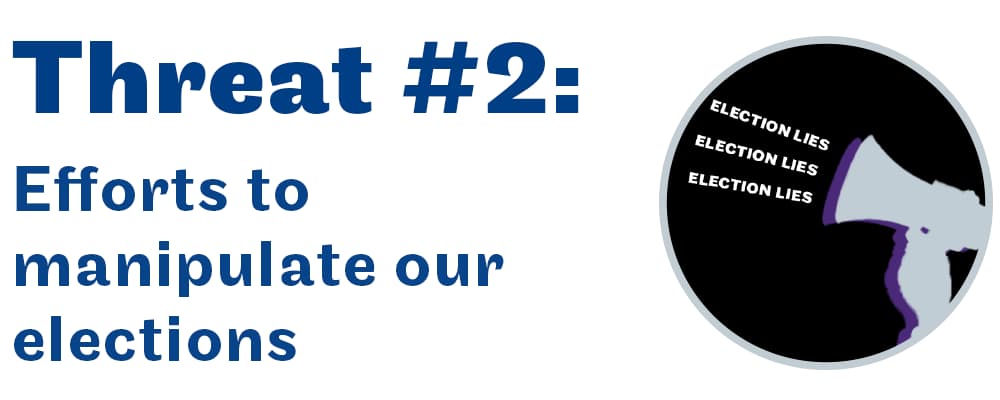
As so many election officials and election workers leave these roles, there’s been an influx of hyperpartisan, anti-democracy candidates for these important positions — individuals who continue to deny the results of the 2020 presidential election and peddle conspiracy theories about the administration of our elections and the officials who run them.
“Election officials are making our democracy function,” Philadelphia’s Al Schmidt recently told Issue One during an interview for our “Swamp Stories” podcast. “If they falter and they leave and they’re replaced by people who don’t know what they’re doing or people whose job it will be to run elections, but at the same time, trying to undermine confidence in them, that’s a very dangerous place for us to be.”
A recent report by States United Action found that two out of three contests for governor and secretary of state this year include an anti-democracy, election denier candidate. States United Action specifically found that 53 election denier candidates are running for governor in 24 states and 22 election denier candidates are running for secretary of state in 18 states, as of March 1.
When conspiracy theorists and anti-democracy candidates run for election administration positions, voters are the losers. If elected, such individuals will be in positions to hijack the management of elections for partisan gain. They could enact changes to fundamental election and voting practices that could lead to an outright reversal of the will of voters.
Former President Donald Trump has been endorsing candidates up and down the ballot who peddle his lies about the 2020 election — including multiple candidates running for secretary of state.
At the same time, Trump’s former adviser Steve Bannon has unveiled a “precinct strategy” that aims to get anti-democracy, conspiracy-minded individuals into positions at the lowest level of the GOP, where they will have influence over choosing poll workers and picking members of the boards that oversee elections — positions that should be about putting voters first. Bannon recently said: “We’re taking action. We’re taking over school boards. We’re taking over the Republican Party with the precinct committee strategy. We’re taking over all the elections.”
At the local level, extremists who deny the results of the 2020 election are already obtaining influential positions in the country’s election apparatus. For instance:
- Robert Boyd — a man who has stated that he would not have certified the results of the 2020 election — now serves as the vice chair of the board of canvassers in Wayne County, Michigan.
- Nancy Tiseo — who, in November 2020, urged then-President Donald Trump to “use the Insurrection Act” to postpone the meeting of the Electoral College in December so “military tribunals” could investigate the presidential election — now serves on the board of canvassers in Macomb County, Michigan.
- Stephen Lindemuth — who declared his candidacy to be a judge of elections in Lancaster County, Pennsylvania, shortly after returning home from then-President Donald Trump’s January 6 rally in Washington, D.C., that preceded the attack on the Capitol — recently won his race.
Moreover, state legislatures across the country are attempting to seize power from state and local election officials when it comes to administering elections. In perhaps the most egregious threat against the democratic process, at least seven states have introduced bills that would allow partisan officials to change or overturn election results.
In Arizona, Missouri, and Nevada, state legislators introduced bills that would allow the state legislature itself to directly reject election results. One bill in Arizona would require the legislature to come into special session after every regular primary and general election and vote to reject or approve the preliminary results. So far, none of these bills have passed. But if such legislation was enacted, it could quickly send the country into a constitutional crisis.
Legislatures have also introduced and enacted bills shifting power over elections from local and state election officials to partisan actors.
Georgia’s SB 202 bill, which was signed into law in March 2021, replaces the secretary of state as chairperson of the state election board with an individual chosen by the legislature. This means that a majority of the five-person board will now be appointed by the legislature.
And Arkansas has enacted three laws that take certain election administration powers away from elected county clerks and grant them instead to county board of election commissioners (which are controlled by the majority political party in the state).
Finally, laws that empower partisan poll watchers have been enacted in at least three states — Texas, Florida, and Georgia. These laws will make it significantly more difficult for election workers to maintain orderly polling locations and prevent voter intimidation.
In some cases, they allow poll watchers to stand intimidatingly close to election workers. One bill introduced in Texas, for example, would require poll watchers to have free movement throughout an entire voting location and would threaten election officials with criminal charges if they remove or obstruct poll watchers.
These measures inject partisanship and politics into the election process and threaten basic principles of how our democracy works. It’s no coincidence that they’re happening in the states that decided the 2020 election.
If individuals that peddle disinformation fill the ranks of local election administration and state legislators strip public servants of their ability to fairly administer elections, all future elections are at risk.

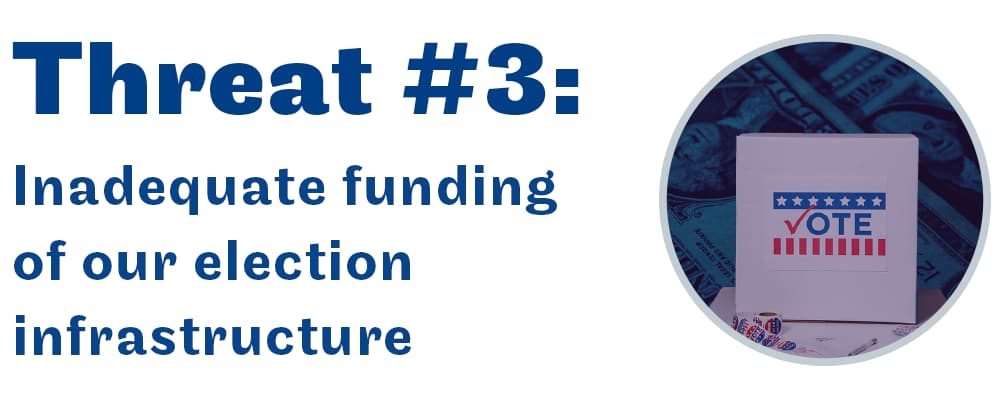
Despite the challenges of the COVID-19 pandemic, successful elections were held in 2020 thanks to the hard work of more than 10,000 public officials and hundreds of thousands of temporary poll workers across the country — elections that were described by then-President Donald Trump’s Department of Homeland Security as the “most secure in American history.”
Ahead of the 2020 elections, Issue One and our coalition partners helped win $825 million in federal funding to assist states in improving their cybersecurity and managing their elections amid the pandemic — $425 million in 2019 specifically for cybersecurity improvements and another $400 million in 2020 for election assistance during the pandemic. Unfortunately, this level of funding was nowhere near the amount that states, counties, and cities needed.
Amid pleas from local election officials for more help, private philanthropy stepped up to help close the gap. Among those who answered the call were former California Gov. Arnold Schwarzenegger (R-CA) as well as Facebook CEO Mark Zuckerberg and his wife, Priscilla Chan.
Zuckerberg and Chan donated roughly $350 million through the Center for Tech and Civic Life to 2,500 local election departments across the country to help administer safe elections in nearly every state by funding basic things like purchasing personal protective equipment, recruiting a sufficient number of poll workers, and voter education efforts.
Grants were used to purchase items such as ballot printers, folding machines, label makers, postage machines, sorting machines, barcode scanners, machines with signature verification software, letter-opening machines, high-speed scanners, counting/tabulation machines, and more.
One local election official said they were finally able to replace their town’s three hand-crank ballot boxes that were manufactured in the early 1900s, one of which was held together with duct tape. Another said they used grant money to purchase “Vote Here” signs and “I Voted” stickers — expenditures that previously “have never been an option” because of how poor the county is.
Others said they were able to use grants to purchase secure environments for storing and processing ballots, including secure storage bins, shelving, and tamper-proof seals. Still others used grants to purchase computers and laptops, which boosted their ability to do everything from process ballot applications and verify signatures to speed up the check-in process at polling places.
Democracy may have broken irrevocably in 2020 if private philanthropy had not stepped up, but future elections should not have to depend on private philanthropy to run smoothly and safely.
Supporting our election infrastructure, which has been deemed “critical infrastructure” by the Department of Homeland Security, is an inherently governmental function. This point was echoed in an op-ed last year by a bipartisan pair of county clerks in Missouri, Republican Shane Schoeller and Democrat Brianna Lennon: “While we are thankful for 11th-hour grants that got us through the year, an elections system funded by inconsistent federal funding and philanthropy cannot be our new normal.”
Similarly, Republican Ricky Hatch, the county clerk of Utah’s Weber County and the chairman of the elections subcommittee of the National Association of Counties, last year stressed to Congress that “ensuring that our elections are free and secure will take continued assistance from our federal and state governmental partners.”
Increased federal funding would allow local election officials to bolster their election administration operations through measures such as improving post-election audits, upgrading voting system technology, modernizing voter registration systems, and continuing to make cybersecurity enhancements, which must be done on a regular basis to address technology changes and developing threats.
In December, the Center for Secure and Modern Elections estimated that replacing outdated voting machines across the country over the next decade alone would cost $1.8 billion. And earlier this year, the Brennan Center and Verified Voting published a report highlighting how the principal voting equipment in 23 states is no longer manufactured.
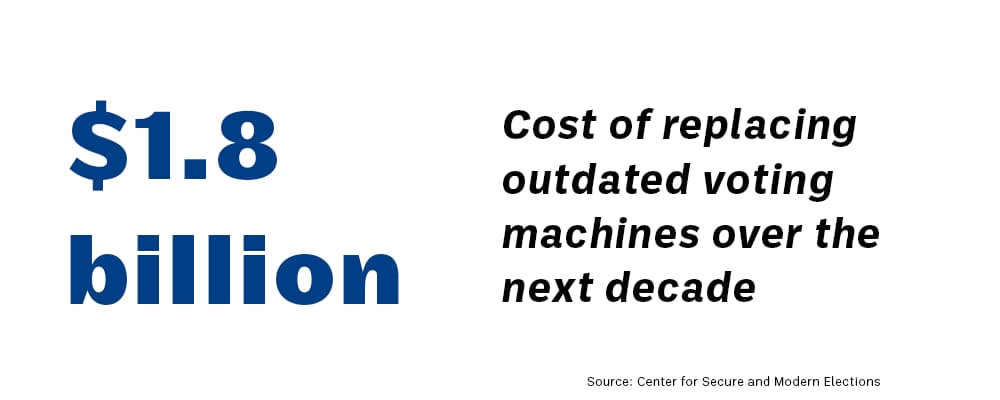
If there is not an increase in regular, predictable funding for our election infrastructure, critical gaps will remain at the municipal, county, and state levels. Many jurisdictions may not be able to hire enough poll workers, maintain their existing voting equipment, purchase updated voting equipment, or provide sufficient public education to voters.
Like bridges that collapse after not getting regular maintenance, failures of our election infrastructure can also be catastrophic, and the costs of dealing with those catastrophic failures are also higher than if routine funding had been provided all along. Both transportation infrastructure and election infrastructure failures are preventable, and we should act as such.


Taken together, these three threats pose a huge danger to the fair administration of future elections, including the 2022 midterms and 2024 presidential election. We must now do everything possible to address the exodus of election officials, combat efforts to manipulate our elections, and ensure that our election infrastructure receives sufficient funding.
Specifically, we must:
1) Pass legislation through Congress that protects election workers and prevents the manipulation of our elections
Congress should pass stronger laws to prevent manipulation of elections and protect election workers — from states’ top election officials to the frontline poll workers who are our friends, neighbors, and family members.
By expanding protections, such legislation would not only help the Department of Justice go after those who are harassing and threatening our election workers, but the passage of new laws would also send a strong message and serve as a deterrent.
Congress could consider making it a federal crime to intimidate or threaten election workers, including those working during the counting and certifying processes as well as on Election Day itself. And federal protections for election workers could be expanded to include election officials’ family members as well as volunteer poll workers and people involved in the supply and maintenance of election equipment.
Several bills that would provide additional protection for election officials and election workers have already been introduced in Congress, with co-sponsors from across the ideological spectrum. Congress must seize this bipartisan momentum to defend election officials and send a clear signal to those who seek to disrupt free and fair elections.
2) Increase funding for critical election infrastructure
To allow election officials to strategically plan, federal investment in election administration should be predictable and large enough to meet the needs of all state and local jurisdictions. The quality of election administration any voter receives should not be dependent on the size, or tax base, of their county. Increased funding for election infrastructure will allow state and local governments to modernize and maintain voting technology, strengthen cybersecurity, and ensure adequate staffing and staff training for election officials.
Issue One — along with the American Enterprise Institute, Bipartisan Policy Center, R Street Institute, and Unite America — recently proposed an incentive structure that would provide annual federal funding to states that meet minimum standards for voter registration, casting ballots, and counting votes. A percentage of these grants should be matched by the states to demonstrate their investment in their election infrastructure.
Such a system would incentivize states to implement critical election infrastructure policies while still maintaining state control over elections. As the report notes: “A regular, annual investment in elections by Congress demonstrates a commitment to the legitimacy and security of the voting process.”
3) Increase enforcement and prosecution of threats against election workers
The disturbing facts outlined in this report show why the enforcement and prosecution of threats against election officials needs to be stepped up. As recently as September 2021, John Keller, a senior attorney at the Department of Justice said that the federal government’s response “has been inadequate.” This environment led some, including Democratic super lawyer Bob Bauer, Republican super lawyer Ben Ginsberg, and David Becker of the Center for Election Innovation and Research, to launch the Election Official Legal Defense Network to provide pro bono legal assistance to election workers who have been harassed and threatened. Protect Democracy is also providing pro bono legal assistance to election workers who have been harassed and threatened.
Adopting a “zero tolerance” policy regarding harassment and threats against election officials, election workers, and their family members should be a priority for local law enforcement as well as for the FBI. As Deputy Attorney General Lisa Monaco has said: “A threat to any election official, worker, or volunteer is a threat to democracy.”
It is encouraging that the Department of Justice created a task force to combat threats against election workers last summer and that it made its first two arrests in January. This task force must be fully supported and should continue to vigorously pursue those threatening the public servants who help our elections run smoothly.
4) Social media companies need to fight disinformation
Social media platforms have played a key role in spreading and amplifying disinformation about the administration of our elections. Online disinformation has exacerbated threats against election workers and fostered an appetite among some Americans for anti-democracy candidates that peddle conspiracy theories. While social media platforms have made numerous changes to their policies in recent years that strive to combat disinformation, the steps taken so far are not nearly enough. Major social media companies are still failing to limit disinformation, partly because policy changes have been reactive and haphazard rather than proactive and comprehensive. As Decode Democracy has noted, “platforms generally waited to shift their policies until after online disinformation and hate speech resulted in significant real-world damage.”
Congress and the executive branch should work together to create comprehensive, bipartisan solutions that combat online disinformation campaigns and foster a social media environment that contributes positively to our nation’s civic health. Possible statutory reforms can encompass a wide range of issues, like prohibiting online voter intimidation and false election speech, protecting data privacy, and addressing discriminatory algorithms.
Disinformation and vitriol drive online engagement, which makes social media companies more money from advertisers. These incentives need to change. Moreover, as Facebook whistleblower Frances Haugen and others have noted, when the platforms operate in secret and don’t make their data public for independent analysis, they will miss things and open the door for influence operations run by China, Iran, Russia, and other malicious actors. Greater transparency is needed to ensure that the U.S. government, independent watchdogs, researchers, journalists, and the public are aware of disinformation campaigns and can help hold social media companies accountable.
As groups such as Common Cause have noted, social media companies don’t need to wait for Congress and state legislatures to pass laws to combat election disinformation on their platforms. They have ample resources they can devote to fighting the lies that threaten our elections. To start, they should commit to upholding and consistently enforcing the anti-disinformation policies they already have in place, and they should close loopholes in those policies that allow disinformation to spread. Additionally, they should point users to state and local election officials as reliable sources of information on voting and elections. Finally, they should reexamine their algorithms to ensure that they do not prioritize the spread of election disinformation, and they should devote more resources to outside audits of their algorithms.
5) Recruit more poll workers — including you!
The 2020 election was secure because local election officials did their jobs with honesty and integrity, even under immense pressure and threats to their safety.
When many of the older adults who have traditionally staffed the polls were unable to work in 2020 due to the COVID-19 pandemic, organizations teamed up to recruit hundreds of thousands of poll workers. To protect our democracy, those recruitment efforts to bring dedicated, nonpartisan volunteers and poll workers into the fold must continue.
Threats to election officials and the mass exodus of election administrators, election workers, and poll workers means that we’ll once again need strong recruitment efforts, especially targeted toward younger Americans, from organizations like A More Perfect Union, Power the Polls, Poll Hero, and We the Veterans. Anyone who cares about our democracy and feels comfortable volunteering should sign up. And organizations — from Fortune 500 companies to small businesses to labor unions to religious organizations — should be supportive of such recruitment efforts.
Ahead of the 2020 election, Snapchat released new products and partnerships to help recruit poll workers. Companies ranging from Facebook to Old Navy to Target paid their employees to serve as poll workers. Such efforts must be redoubled ahead of the 2022 and 2024 elections.
Time for action
Now is the time to fight the systematic effort that is underway to threaten election officials, hijack the nonpartisan administration of elections, and make it harder for certain voters to cast their ballots. Our democracy is at risk, but together we can combat these existential threats and avert a constitutional crisis. The will of the people alone is what should determine the outcomes of our elections, and anti-democracy candidates have no place in the administration of elections in a country that strives to be a beacon of freedom to the world.


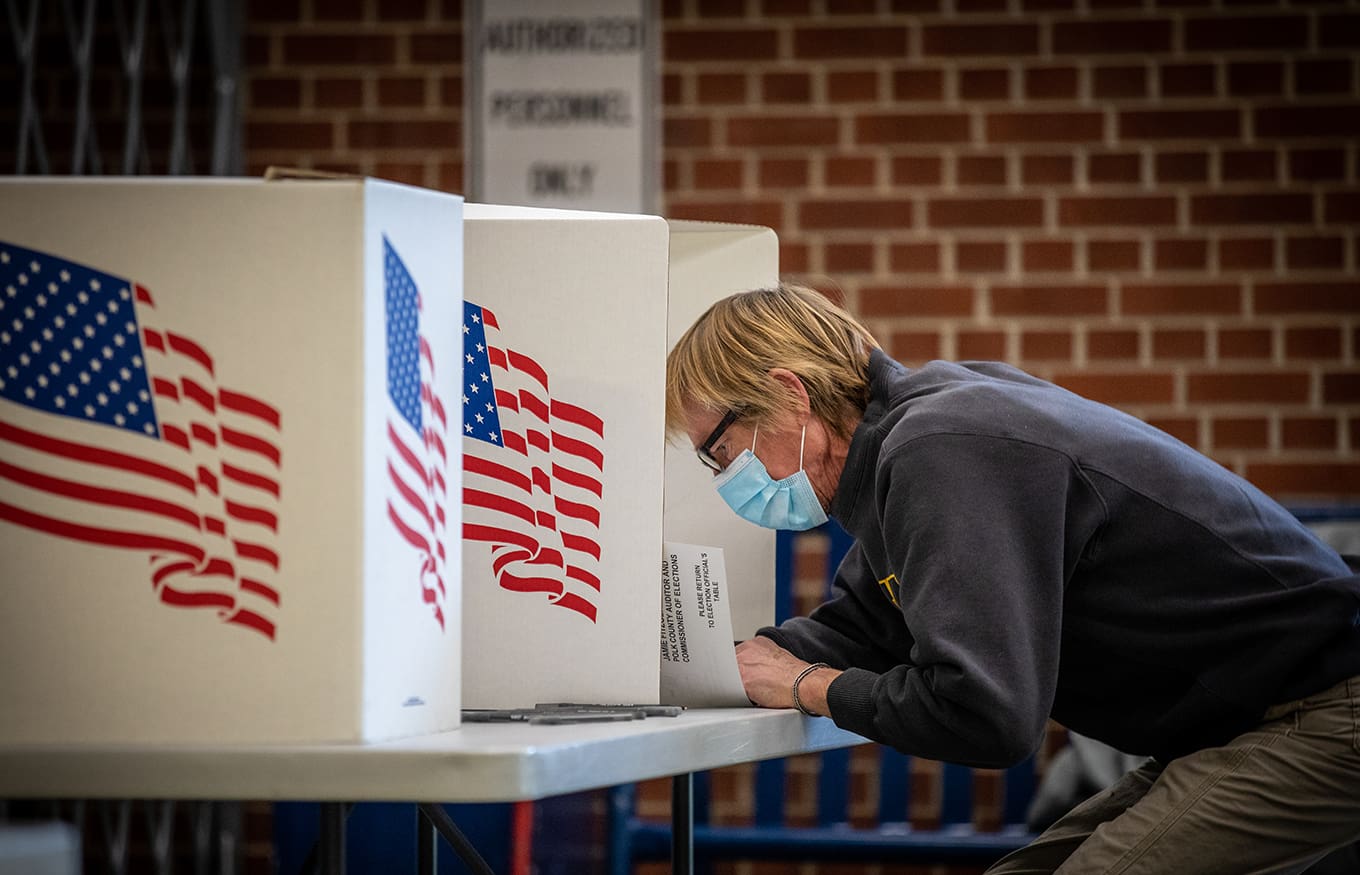 Photo credit: Phil Roeder/CC BY 2.0
Photo credit: Phil Roeder/CC BY 2.0









